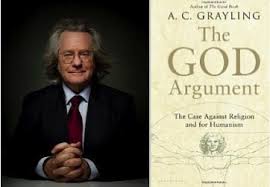Obviously, Professor A. C. Grayling must be a very busy man. I don't doubt that teaching, writing, and interviews keeps him quite busy. However, I confess that I am finding it very difficult to believe that his schedule has been completely booked for the rest of his life. I simply can't understand why he can't carve out a few hours of spare time to burst my bubble of egotistical pride, by demonstrating the intellectual superiority of his atheistic humanism once and for all. After reading his book and blogging about it twice because I appreciated the skill of its authorship, I grew bold and wrote the good professor to propose a written debate that would pit his GOD Argument versus my Counterargument for God. You see, I paid attention when I read his book. I believe that already know much of what the professor might say, and it gave me the confidence to approach him. I am quite convinced that my counterargument can defeat his argument, even though my book was originally intended to rebut The God Delusion of Richard Dawkins. So when Grayling's first assistant asked me to define the parameters for the debate I proposed admittedly, my hopes rose. My reply suggested that Professor Grayling could set the debate parameters for debate himself. My offer said that we could schedule our discussion for any future exchange at his convenience. So you might imagine my surprise when his second assistant replied and said that it would never be convenient. Not even sometime in late 2016? I asked. Nope. Never, as in never, ever. Please forgive me for stating … [Read more...]
A. C. Grayling and The GOD Argument
I've enjoyed reading The GOD Argument: The Case Against Religion and for Humanism, in spite of the fact I disagreed with much of what author A. C. Grayling wrote. As I asserted in my earlier blog about the Scopes Monkey Trial, Professor Grayling is an excellent writer. At times, his book forced me to exercise the little grey cells in my head quite vigorously. For example, at first I couldn't figure out why Professor Grayling described the problem as 'logically impossible' when he wrote: Consider the sentence, 'I can trisect a Euclidean angle using only ruler and compass.' This is a grammatical and even in one sense an intelligible sentence, but it claims something that is logically impossible to do -- and therefore to think. I must confess that relatively simple sentence initially befuddled me. After all, I could envision drawing a two-dimensional right angle with a horizontal line intersecting a vertical line at 90 degrees, and then trisecting it at 30 and 60 degrees rather easily with a compass. However, I sensed that I was missing something that must be obvious and could not be understanding the problem correctly, if what Professor Grayling wrote was true. And my instincts were correct. It turned out the operative word in that deceptively simple sentence was 'Euclidean' -- apparently referring to a three-dimensional angle, like what you would find in the corner of a room formed where two walls meet. Then I realized what Grayling must have meant, and he's right: the task is impossible to perform using only a ruler, pencil and compass. On the other hand, … [Read more...]
The truth about the Scopes Monkey trial
I've been reading A. C. Grayling's most excellent book titled The GOD Argument -- after all, I don't have to agree with the man's opinions to admire his talent as a writer -- and a realization suddenly struck me, sort of like a bolt of lightning. Another article I've been working on and will publish soon discusses the some of the more interesting topics in Grayling's book, in much greater detail. For the remainder of this article, I'd like to focus attention on just one particular thing Grayling said in his book that I found to be very questionable. Then I plan to connect my observations on this comment to my own personal moment of revelation, that "lightning bolt" moment I mentioned in the first paragraph. Beginning on page 108, Professor Grayling wrote: Since the humiliating defeat of the literal six-day creationist lobby in the Scopes Monkey Trial of 1925 in Tennessee, religious groups have become increasingly sophisticated in their efforts to promote the idea that the universe and life in it were made by an intelligent agency, just as a carpenter makes a table; except that whereas a carpenter has his planks and nails to hand when he starts, the mega-carpenter did not have any materials ready beforehand, but made them too, from nothing. When I first read the passage above, I thought, huh? That paragraph is clearly giving the reader the distinct impression that the Scopes Monkey trial was an overwhelming victory for the Darwinian theory of evolution, and nothing less than a crushing defeat for young earth creationism. The problem with the impression … [Read more...]


